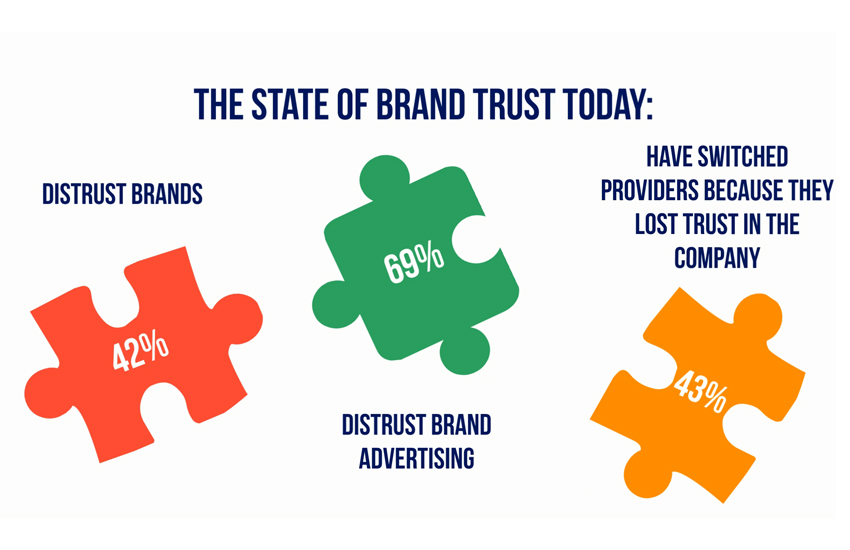Building Brand Trust sets the foundation for long-term success in business, exploring essential strategies and insights that drive customer loyalty and credibility.
From the significance of brand values alignment to the impact of customer reviews, this discussion delves into the core elements that shape trust in today’s competitive market.
Importance of Building Brand Trust
Building brand trust is like the key to the kingdom for businesses. It’s all about creating a solid foundation of credibility and reliability that customers can rely on. When a brand is trusted, customers are more likely to choose their products or services over competitors, leading to increased sales and growth.
Examples of Successful Companies with Strong Brand Trust
- Apple: Known for its innovative products and exceptional customer service, Apple has built a strong brand trust over the years.
- Amazon: With its focus on customer satisfaction and fast delivery, Amazon has become a trusted name in online retail.
- Nike: Through its consistent quality products and powerful marketing campaigns, Nike has established itself as a trusted brand in the sports industry.
Impact of Brand Trust on Customer Loyalty and Retention
Brand trust plays a crucial role in customer loyalty and retention. When customers trust a brand, they are more likely to make repeat purchases and recommend the brand to others. This leads to higher customer retention rates and increased customer lifetime value.
Strategies for Building Brand Trust
Building trust with consumers is essential for any brand to succeed in today’s competitive market. There are various strategies that companies can utilize to establish and maintain trust with their audience. Let’s explore some of the different approaches brands can take to build brand trust effectively.
Traditional Methods vs. Modern Approaches
In the past, companies often relied on traditional methods such as advertising, public relations, and endorsements from celebrities to build brand trust. While these strategies can still be effective, modern approaches have become increasingly popular in the digital age. Brands now focus on transparency, authenticity, and engaging directly with consumers through social media and other digital platforms. By creating meaningful connections and providing valuable content, brands can establish trust with their audience in a more authentic way.
- Traditional Methods: Advertising, PR campaigns, celebrity endorsements.
- Modern Approaches: Social media engagement, influencer partnerships, user-generated content.
Innovative Brand Trust Examples
Some brands have successfully implemented innovative strategies to build trust with consumers. For example, Patagonia’s commitment to environmental sustainability and ethical practices has earned the trust of environmentally-conscious consumers. Similarly, Airbnb’s user reviews and transparent pricing have helped establish trust among travelers. By prioritizing honesty, integrity, and customer satisfaction, these brands have created strong relationships with their audience based on trust and credibility.
- Patagonia: Sustainable practices, ethical sourcing, transparency.
- Airbnb: User reviews, transparent pricing, customer feedback.
Communicating Brand Values

Communicating brand values is crucial for building trust with customers. When a brand’s values align with customer expectations, it creates a sense of authenticity and reliability, leading to stronger connections and loyalty.
Importance of Aligning Brand Values with Customer Expectations
- Customers are more likely to trust and support brands that share their values.
- Alignment helps in creating a consistent brand image and messaging.
- It enhances brand differentiation and competitive advantage in the market.
Tips for Effectively Communicating Brand Values
- Be clear and consistent in showcasing values through branding, messaging, and actions.
- Use storytelling to connect with customers emotionally and convey the brand’s mission.
- Engage with customers actively on social media platforms to reinforce values.
Role of Transparency in Conveying Brand Values
Transparency plays a vital role in communicating brand values and fostering trust among customers. By being open and honest about business practices, sourcing, and decision-making processes, brands can build credibility and establish long-term relationships with their audience.
Customer Reviews and Testimonials

Customer reviews and testimonials play a crucial role in building brand trust as they provide social proof of a brand’s credibility and quality. When potential customers see positive feedback from satisfied clients, they are more likely to trust the brand and make a purchase.
Best Practices for Leveraging Customer Feedback
- Respond to reviews promptly, whether they are positive or negative, to show that you value customer feedback.
- Showcase customer testimonials on your website and social media platforms to highlight the positive experiences of past clients.
- Incorporate customer reviews into your marketing materials to reinforce the credibility of your brand.
- Encourage satisfied customers to leave reviews by offering incentives or making the process easy and convenient.
Impact of Social Proof on Consumer Trust
Social proof, which is the influence of others on our own behavior, plays a significant role in building consumer trust in a brand. When potential customers see that others have had positive experiences with a brand, they are more likely to trust that brand and feel confident in their purchasing decision.
Consistency in Branding
Maintaining consistency in branding is crucial for building brand trust and recognition among consumers. When a brand presents a consistent image, message, and experience across all touchpoints, it helps to establish a sense of reliability and credibility with customers.
Examples of Consistent Brands
- Apple: Known for its sleek design, innovative technology, and minimalist branding across all products and marketing materials.
- Coca-Cola: Maintains consistent red and white branding, font styles, and messaging globally for decades.
- Nike: Recognizable swoosh logo, consistent use of “Just Do It” slogan, and branding that promotes athleticism and empowerment.
Impact of Inconsistency, Building Brand Trust
Inconsistency in branding can confuse consumers, dilute brand messaging, and ultimately erode trust and credibility. When a brand fails to deliver a consistent experience or message, it can lead to a lack of confidence among customers and make it difficult for them to connect with the brand on a deeper level. This inconsistency can result in a loss of loyalty and a negative impact on the overall brand reputation.

